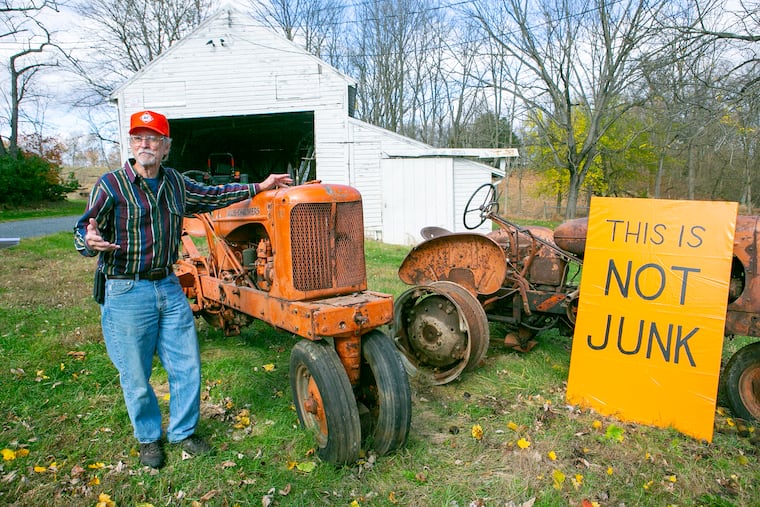Is old farm equipment on the lawn part of rural Pennsylvania’s charm — or just junk?
“Please keep our area free of the snobby city attitude that we could all live without,” one Adams County resident said. “If transplants don’t want to see farm machinery, barns and sheds, etc. then they should not have moved here!”

HIGHLAND TOWNSHIP, Pa. — Some think the smell of a hog farm is like a punch in the nose, that a deer splayed and hanging from a porch is gore, or that the farming tractors on Gil Pringle’s lawn belong in a scrap yard.
Aside from the postal carrier, most people never see Pringle’s tractors. He lives on a former goat farm a half-mile off a two-lane road in this township of about 1,200 in rural Adams County, just a few miles from Gettysburg. Still, Pringle, 72, has a bright orange sign leaning against the tractors with “This is not junk” painted in bold black letters to prove a point.
“These are parked here in protest,” Pringle said, pulling tarps off the tractors on a blustery November afternoon.
Earlier this year, Highland Township proposed a nuisance ordinance targeting derelict vehicles, equipment, and structures. If inoperable, the vehicles and machinery would have to be stored indoors; otherwise, owners could be socked with fines ranging from $300 to $1,000 a day. Supervisor Craig Rockey, according to the Gettysburg Times, said complaints had been coming in about “unsightliness" and property values. Residents, he claimed, questioned why they had to look at all this “stuff” every day.
“We don’t have it out for individuals,” Rockey said during a township meeting in June.
Pringle, a former supervisor himself, bucked the ordinance immediately. It was an affront to a way of life, he said, and perhaps a bit hypocritical. Highland Township displays a piece of old farming equipment outside the municipal building much like the antique “dump rake,” used for gathering hay, that sits on his lawn.
Pringle believes that Carl Keller, another former commissioner, was an unidentified target of the proposed ordinance. Keller is a neighbor and longtime farmer, and there’s a lot going on at his property on Knoxlyn-Orrtanna Road. A dozen or more tractors and vehicles sit by the street, along with other pieces of farming equipment. It’s all visible on Google Maps.
“I wouldn’t call it a mess — that’s not a good word — but there’s been equipment parked here for the last 30 years,” Pringle said on a drive through the township. “People who moved here knew it was here.”
Some of the clutter could have been solved with a conversation, he said.
“He’s a neighbor,” Pringle said of Keller. “He served this township for dozens of years.”
The Keller family declined to comment for this article.
Those modern homes, Pringle said, have far higher property values than surrounding, older homes in Highland and reflect an ongoing trend in Adams. The county, about 140 miles west of Philadelphia, has been growing steadily for nearly a century. The population today, 101,407, is more than double what it was in 1950, and both the number of farms and overall farmland acres shrank between 2012 and 2017, according to the U.S. Department of Agriculture.
Facebook groups are dedicated to “Saving Rural Adams,” and others are trying to preserve historic barns here.
Pringle spent his own money to draft a questionnaire that he sent to every address in the township, 555 in total, gauging the public’s opinion on the proposed ordinance. Should a car that can’t be driven on the highway be considered a nuisance? he asked. Should you have to move a riding lawnmower indoors if it breaks down?
One question got to the heart of it: Do you think that Highland Township should be managed more like a suburb and less like a rural community? Ninety percent of the respondents said no.
“Please keep our area free of the snobby city attitude that we could all live without,” one resident commented. “If transplants don’t want to see farm machinery, barns and sheds, etc., then they should not have moved here!”
Only a few of the comments were in support of the ordinance.
“Hoarders should be asked to clean up their property,” one person wrote.
In July, Highland Township’s three supervisors voted to put the ordinance on hold for six months. Rockey did not return several requests for comment.
Pringle believes that the issue could likely come up again, perhaps here, or in other townships with changing demographics. Supervisors, he said, take some direction from the Pennsylvania State Association of Township Supervisors, which offers advice on blight and tidying up townships.
“We’re talking about someone having an old chicken house on their property, not blight,” he said.
A spokesperson for the association did not return a request for comment.
Pringle grew up in Virginia, spending summers on the Adams County farm he now owns. His grandparents bought the property during the Depression. He spent most of his life working in electronics in California, before he moved back here decades ago to raise goats. He plans to he buried here, too, already crafting a tombstone that says he “loved the land.”
A few miles past Keller’s cluttered property, large modern homes sit on a hillside, with sprawling lawns and sweeping views of farmland. Pringle said many of them were built on former apple orchards about a decade ago. Outside one home, an antique-looking carriage is on display, a U.S. flag affixed to it.
“If people don’t like it, they shouldn’t move here,” he said. “It’s like marrying a guy and thinking, ‘I can really change him.’”
Pringle, now retired, said he plans to sell both his Allis-Chalmers tractors, when he gets around to it.